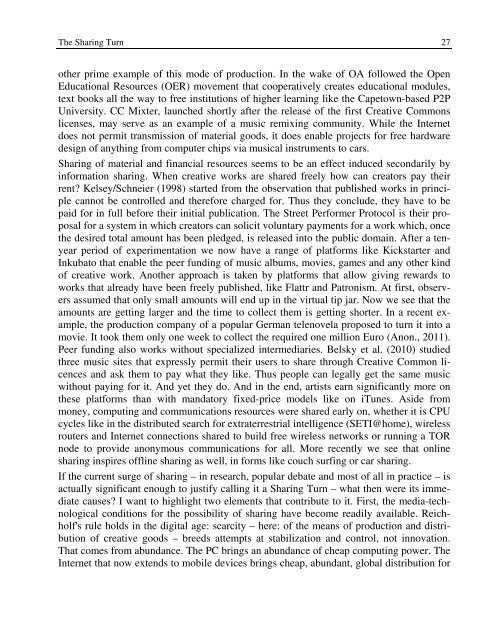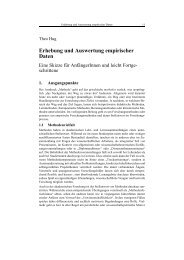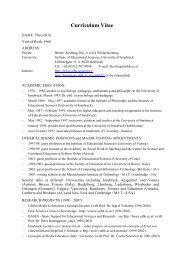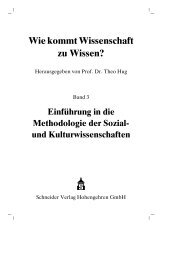Cultures and Ethics of Sharing - Universität Innsbruck
Cultures and Ethics of Sharing - Universität Innsbruck
Cultures and Ethics of Sharing - Universität Innsbruck
- Keine Tags gefunden...
Sie wollen auch ein ePaper? Erhöhen Sie die Reichweite Ihrer Titel.
YUMPU macht aus Druck-PDFs automatisch weboptimierte ePaper, die Google liebt.
The <strong>Sharing</strong> Turn 27other prime example <strong>of</strong> this mode <strong>of</strong> production. In the wake <strong>of</strong> OA followed the OpenEducational Resources (OER) movement that cooperatively creates educational modules,text books all the way to free institutions <strong>of</strong> higher learning like the Capetown-based P2PUniversity. CC Mixter, launched shortly after the release <strong>of</strong> the first Creative Commonslicenses, may serve as an example <strong>of</strong> a music remixing community. While the Internetdoes not permit transmission <strong>of</strong> material goods, it does enable projects for free hardwaredesign <strong>of</strong> anything from computer chips via musical instruments to cars.<strong>Sharing</strong> <strong>of</strong> material <strong>and</strong> financial resources seems to be an effect induced secondarily byinformation sharing. When creative works are shared freely how can creators pay theirrent? Kelsey/Schneier (1998) started from the observation that published works in principlecannot be controlled <strong>and</strong> therefore charged for. Thus they conclude, they have to bepaid for in full before their initial publication. The Street Performer Protocol is their proposalfor a system in which creators can solicit voluntary payments for a work which, oncethe desired total amount has been pledged, is released into the public domain. After a tenyearperiod <strong>of</strong> experimentation we now have a range <strong>of</strong> platforms like Kickstarter <strong>and</strong>Inkubato that enable the peer funding <strong>of</strong> music albums, movies, games <strong>and</strong> any other kind<strong>of</strong> creative work. Another approach is taken by platforms that allow giving rewards toworks that already have been freely published, like Flattr <strong>and</strong> Patronism. At first, observersassumed that only small amounts will end up in the virtual tip jar. Now we see that theamounts are getting larger <strong>and</strong> the time to collect them is getting shorter. In a recent example,the production company <strong>of</strong> a popular German telenovela proposed to turn it into amovie. It took them only one week to collect the required one million Euro (Anon., 2011).Peer funding also works without specialized intermediaries. Belsky et al. (2010) studiedthree music sites that expressly permit their users to share through Creative Common licences<strong>and</strong> ask them to pay what they like. Thus people can legally get the same musicwithout paying for it. And yet they do. And in the end, artists earn significantly more onthese platforms than with m<strong>and</strong>atory fixed-price models like on iTunes. Aside frommoney, computing <strong>and</strong> communications resources were shared early on, whether it is CPUcycles like in the distributed search for extraterrestrial intelligence (SETI@home), wirelessrouters <strong>and</strong> Internet connections shared to build free wireless networks or running a TORnode to provide anonymous communications for all. More recently we see that onlinesharing inspires <strong>of</strong>fline sharing as well, in forms like couch surfing or car sharing.If the current surge <strong>of</strong> sharing – in research, popular debate <strong>and</strong> most <strong>of</strong> all in practice – isactually significant enough to justify calling it a <strong>Sharing</strong> Turn – what then were its immediatecauses? I want to highlight two elements that contribute to it. First, the media-technologicalconditions for the possibility <strong>of</strong> sharing have become readily available. Reichholf'srule holds in the digital age: scarcity – here: <strong>of</strong> the means <strong>of</strong> production <strong>and</strong> distribution<strong>of</strong> creative goods – breeds attempts at stabilization <strong>and</strong> control, not innovation.That comes from abundance. The PC brings an abundance <strong>of</strong> cheap computing power. TheInternet that now extends to mobile devices brings cheap, abundant, global distribution for








